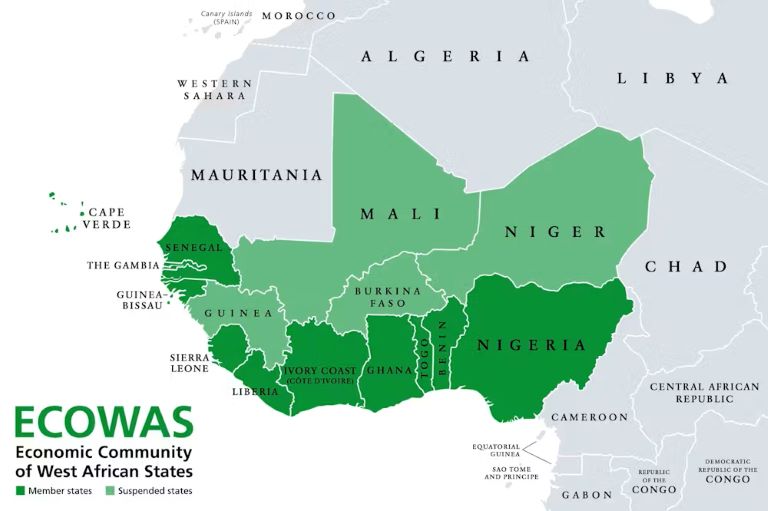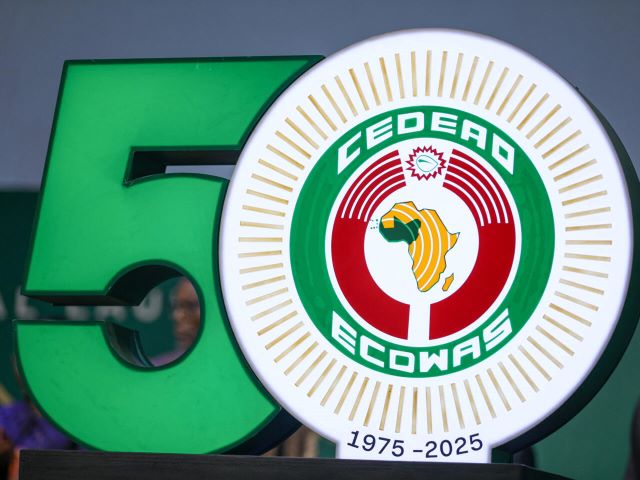The West African geopolitical landscape is undergoing a seismic shift. The Economic Community of West African States (ECOWAS) inability to effectively address the region’s political and security challenges has eroded faith in its vision. The institution has lost its legendary prestige in the eyes of West Africans, and its conduct has caused instability in the region.
ECOWAS, which will celebrate fifty years of existence on May 28, 2025, appears to lack the maturity of its age. The organization, which once symbolized unity, stability, and regional integration, is now a faltering union, a nonchalant entity undermined by internal and external problems that, if not resolved, could lead to its complete disintegration in the coming years.
The rise of the Alliance of Sahel States (ASS), comprising Mali, Niger, and Burkina Faso, led by military juntas, represents not only a daring step but also a fundamental challenge to the existing West African organization.
The Alliance of Sahel States is Weakening ECOWAS’ Authority
The ASS was not formed by impulsive acts but rather a direct consequence of the latent frustrations with ECOWAS’ perceived failures. Mali, Niger, and Burkina Faso, each having experienced coups d’état and grappling with severe security challenges, have increasingly viewed ECOWAS as an obstacle rather than a reliable partner. ECOWAS’ economic sanctions against those countries and its willingness to consider military intervention in Niger after a military junta seized power in July 2023 were the final reasons for the breakup.
The departure of the Sahel states is rooted in the perception of ECOWAS applying a double standard in holding its leaders democratically accountable. While swift condemnation and sanctions were imposed on the Sahelian states following their military takeovers, there is a palpable sense that other member states with less overt but equally damaging democratic deficiencies, such as Togo, have been allowed to operate with impunity. This discrepancy has created resentment and encouraged the narrative that ECOWAS is more concerned with maintaining a certain image than with genuinely advancing democratic values in the region and addressing the fundamental needs of its populations.
The Sahelian states, facing existential threats from Islamist terrorism and feeling abandoned by ECOWAS, have pursued alternative solutions. Their alignment with countries such as Russia and Turkey is a clear indication of their disillusionment with the established ECOWAS-backed order and their willingness to forge new paths to ensure their survival and sovereignty.

Forming the ASS represents a defiant act, a rejection of what they perceive as a biased and ineffective regional body. This bold move, while fraught with its own risks and uncertainties, reflects a deep-seated belief that the existing regional structure has failed them and that a new and assertive Sahelian bloc is necessary for their future.
The recent surge of support for the ASS, both on the continent and across the diaspora, and, particularly, for Capitaine Ibrahim Traoré of Burkina Faso in the face of Western scrutiny and various failed coups, articulates a clear message: The ASS represents a powerful alternative, a vision of leadership that resonates deeply within Africa. It suggests a yearning for leadership that honestly champions the continent’s aspirations and exemplifies the strength and determination that the African people desire in their leaders. This unified protest heralds a profound shift in how the continent envisions its future, while ECOWAS seems to go in the opposite direction.
ECOWAS, from Regional Power to Agonizing Institution
For many decades, ECOWAS served as a cornerstone of regional integration in West Africa, promoting economic cooperation, military collaboration, peace, and stability. Initially, it achieved notable successes in fostering trade, facilitating movement, and even intervening to manage conflicts. However, it has faced significant challenges that have eroded the organization’s credibility and sown the seeds of discontent and distrust, particularly among its populations.
A significant point of contention is ECOWAS’ selective approach to democratic governance. While the organization has, at times, condemned and even imposed sanctions on countries experiencing blatant military takeovers, its response to more insidious forms of democratic backsliding, such as rigged electoral processes and clinging to power beyond constitutional limits, has been conspicuously muted. ECOWAS’ silence raised a sense of injustice and marginalization among populations witnessing the erosion of their democratic rights. Many citizens in West Africa, particularly in the Sahelian states and coastal countries of West Africa, are rebuffing an ECOWAS they perceive as a club for presidents whose agendas are not coordinated with the actual needs and aspirations of the people.
Additionally, ECOWAS has been criticized for its perceived deference to external powers, leading to accusations of being a tool of Western interests rather than a truly independent African institution. Actors seeking to undermine ECOWAS’ authority and foster alternative alliances have exploited this perception, whether or not it is entirely accurate.
The organization’s inability or unwillingness to proactively address the security challenges, development, and governance issues plaguing the region has further fueled the narrative of its insignificance in the eyes of its constituents. The rise of undemocratic regimes, often through the manipulation of elections and consolidation of power under the protection of external influences, has been a blatant wound that ECOWAS has failed to adequately heal, contributing directly to the current fracturing of the regional bloc.
Is ECOWAS Heading Slowly but Certainly Towards its End?
The world has changed, and citizens worldwide aspire to democratic governance and leaders who understand their needs. ECOWAS stands at a critical juncture where bold decisions must be taken for its survival. The persistent reluctance among some of its leaders to adhere to democratic principles, particularly regarding term limits and the suppression of political dissent, poses an existential threat to its long-term viability and moral authority.

The situation in Togo serves as a blunt reminder of this looming danger. The recent constitutional amendment–which effectively transfers the power to elect the president from universal suffrage to a legislature dominated by the ruling party–coupled with the creation of the post of the council of the ministers for the current president reveals the regime’s absolute determination to perpetuate its hold on power indefinitely. ECOWAS’ complicity in this blatant disregard for citizens’ rights to universal suffrage sends a negative signal across the region.
Furthermore, the recent exclusion of prominent opposition figures, such as Charles Blé Goudé, president of the Pan-African Congress for Justice and Equality of Peoples, and Tidjane Thiam, president of the Democratic Party of Côte d’Ivoire, from the upcoming presidential elections in Côte d’Ivoire poses a risk to the country’s stability. Lack of a significant declaration from ECOWAS raises serious questions about the institution’s efficacy and commitment to democratic principles and the future of Cote d’Ivoire, while similar issues led to two civil wars in the country in 2002 and 2011.
After fifty years of existence, ECOWAS is at risk of disappearing if many of its current leaders continue to turn a deaf ear to the rightful desires of their people. Without any real support from its constituents, the West African bloc risks suffering the fate of many empires, kingdoms, and organizations before it.
The only way ECOWAS can escape this fate is the adoption of a radical and comprehensive strategy. This strategy should include a mandate for all presidents who have exceeded their terms to step down and constitutional amendments across the region establishing firm term limits. This is likely to be difficult, since many of the region’s leaders refuse to embrace democratic values honestly. The consequences of failing to take some action, however, are dire. First, there is the growing influence of ASS in the region, despite its inherent challenges and uncertainties. The ASS can potentially supplant the established but seemingly nonchalant regional bloc. Second, there might be new military coups in the coming months with an alarming expansion of the influence of Russian and Islamist groups.
Such a trajectory would undoubtedly bury ECOWAS. By 2030, West Africans may chant, “Vive ECOWAS, ECOWAS est mort.”
The opinions expressed in this letter are strictly those of the author and do not necessarily align with the views of JolibaLive News! or any of its staff members. The author is in no way associated with this online news blog.
Komlan Avoulete is a Sahel researcher, geopolitical analyst, and freelance writer. His expertise lies in African affairs, with a focus on US-Africa relations, France-Africa relations, and West African terrorism. He is a regular contributor to publications such as the Foreign Policy Research Institute and the International Policy Digest.
Rate, Like 👍, Comment, share this article and Follow us on our social media handles.








